Israel-Hamas War - What happened on day 70?
Netanyahu on killing of Gaza hostages: We will lick our wounds, learn our lessons • Sirens sound in Israel's capital of Jerusalem
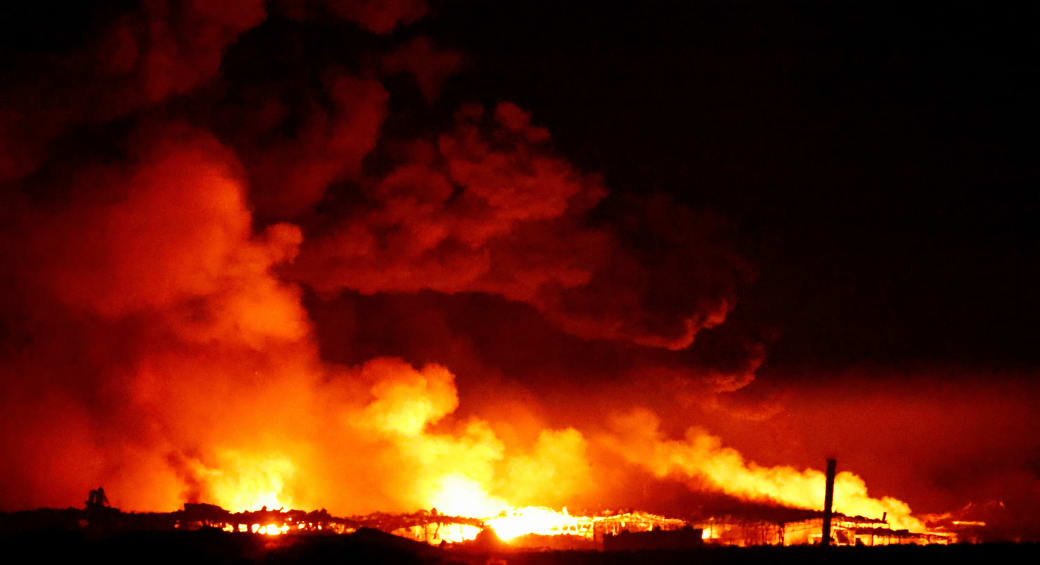

IDF mistakenly kills three hostages in Gaza
An investigation has been opened into the circumstances of the killing of the three hostages.

During operational activity in the Gaza City neighborhood of Shejaia, IDF troops killed three hostages taken by Hamas after mistaking them for terrorists, IDF spokesperson Daniel Hagari said on Friday evening.
The three victims include Yotam Haim, who was abducted from Kfar Aza on October 7 and Samer Talalka who was abducted from Nir Am on the 7th.
During fighting in Shejaiya, Gaza, an IDF force mistakenly identified three Israeli hostages as a threat. They opened fired and killed them.
— Aviva Klompas (@AvivaKlompas) December 15, 2023
The bodies were returned to Israel and identified as:
🕯️ Yotam Haim, abducted from Kfar Gaza
🕯️ Samar Fouad Talalka, abducted from Nir Am… pic.twitter.com/Cx6KbGw7RH
The family of the third victim asked that they not be identified.
Identifying the bodies
The IDF said that following the incident, acting on a suspicion of the identities of the deceased, their bodies were brought back to Israel for examination where it was determined they had, indeed, been among the hostages.
The IDF added that an investigation was immediately opened into the circumstances of the event. So far, the details regarding what happened have not yet been discussed with the public.
This is a developing story.
Go to the full article >>IDF launches first major attack on Rafah, Philadelphi Corridor in Gaza
Any attack in that area is highly charged because it borders Egypt and has diplomatic implications for Israel's relations both with Cairo and globally.
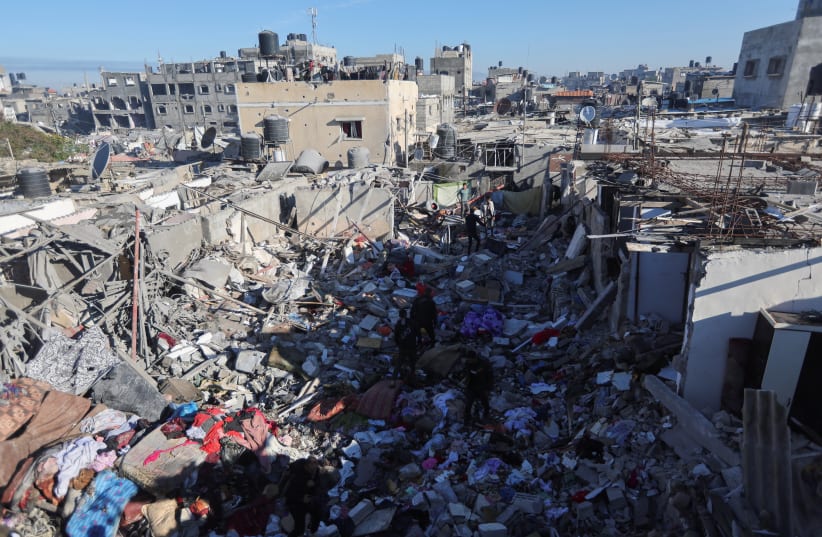
Israel launched its first major attack on the politically-sensitive Rafah area and Philadelphi Corridor in southern Gaza, using aircraft and drones, the IDF announced Friday.
Any attack in that area is highly charged because it borders Egypt and has diplomatic implications for Israel's relations both with Cairo and globally.
Militarily, The Jerusalem Post understands that the IDF has, to date, steered more clear of Rafah because of those sensitivities.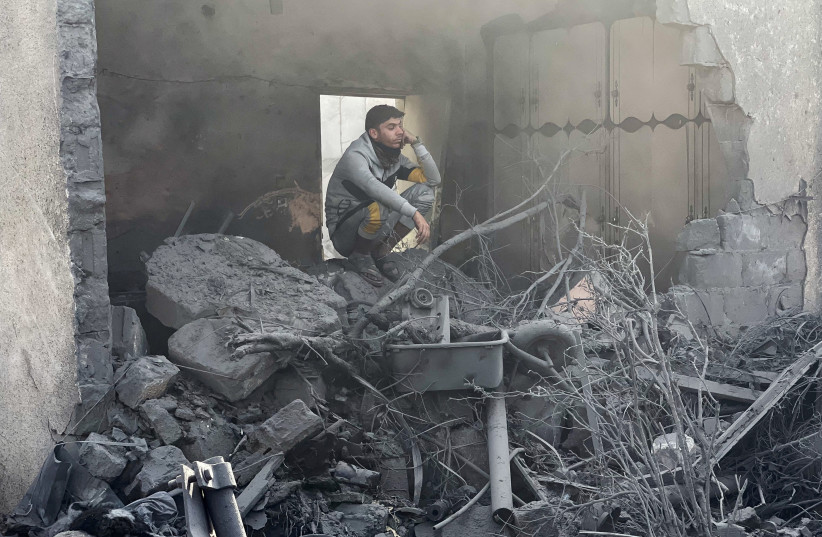
Hamas using Rafah to launch rockets
The Post also understands that most of the recent ongoing rocket fire from Hamas is from Rafah, given that northern Gaza and even Khan Yunis in southern Gaza are now under heavy IDF attack.
Without addressing Rafah, Hamas could continue to maintain rocket fire even if its forces in most other areas are being slowly routed.
The IDF attack destroyed Hamas terror infrastructure, lookout posts, and, specifically, its infrastructure for smuggling weapons into Gaza from Egypt.
According to the IDF, the attacks will both reduce Hamas's ability to rearm and resupply as the war continues and will also reduce Hamas's capabilities to hijack humanitarian aid coming into Gaza from Egypt.
Go to the full article >>Israel's hostages in Gaza: Nik Beizer, an IDF soldier
Early on Saturday morning, October 7, Ekaterina’s phone buzzed with notifications that missiles were being launched toward Nik’s base. Then, it turned out he was held hostage by Hamas.
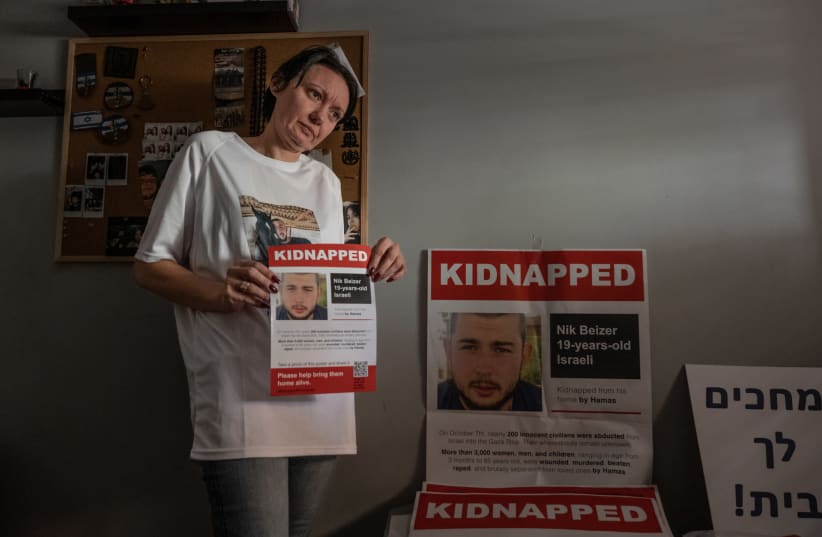
Disclaimer: This article was originally published on October 27. On Friday, December 15, the IDF announced they had returned Nik Beizer's body to Israel after his death in Hamas captivity.
Dignity, determination, sadness, worry, and hope are just some of the words that can be used to describe the state of Beersheba resident Ekaterina Beizer, mother of 19-year-old Nik Beizer, an IDF soldier who is one of the over 220 hostages being held by Hamas in Gaza.
In the midst of war, Beersheba is a shadow of its bustling self. Traffic is light on the city’s streets, and most of the stores and eateries in the city’s vast Grand Canyon Shopping Mall are closed. The thrum of IAF aircraft heading south to Gaza is regularly heard, and sirens warning of incoming missiles have been a daily occurrence.
The atmosphere in the Beizer family’s apartment is subdued. The large flat-screen television attached to the wall flashes the latest war updates from the talking heads on the news, though the volume has been muted.
Even Martin, the family’s Yorkshire Terrier, realizes that something is amiss, and darts nervously throughout the apartment. Ekaterina is wearing a T-shirt with a photo of Nik standing next to a horse, taken on a family vacation in August. The words “Bring Nik Home” are emblazoned on the shirt in their Hebrew equivalent.
Ekaterina and her husband, Sergey, made aliyah from Ukraine in 2000, were married in Israel, and have two children – Nik and 15-year-old Nikol.

“Since he was a boy,” Ekaterina smiles, “Nik was interested in everything. There was no activity in Beersheba that he didn’t join, whether it was art, martial arts, basketball, or bowling. He is very curious and is a boy who wants to learn.”
Nik, says his mother, is industrious, and worked in the family’s industrial renovation business from the age of 14, with the goal of earning money to obtain his driver’s license as soon as possible. He passed the driving test before he was 17 and bought a car with the money he had saved from his job.
“He always helped the weaker kids who were getting picked on in school,” says Ekaterina. “If he saw someone having a tough time, he would help him.”
Nik Beizer: An IDF soldier held hostage in Gaza
On April 30, Nik joined the IDF and, after completing basic training, was stationed at Erez Crossing, where he was a driver at the Erez District Coordination Office (Matak Erez), which coordinates with the Palestinian Authority regarding import and export, training, standardization, escorting convoys, and Palestinian businesses.
Ekaterina proudly shows a picture stored on her phone from Nik’s IDF swearing-in ceremony, where he received the award for outstanding soldier in his division.
“He didn’t tell us [about the award] beforehand,” she relates with a smile. “It was a surprise to us.”
Upon joining the IDF, says Ekaterina, Nik displayed his talent for helping others and was frequently assigned to assist soldiers who had just arrived at the base and were having difficulty acclimating to the conditions there.
Nik was stationed on the base six days a week and spent Shabbat there once a month. He was scheduled to be home on the fateful Shabbat of October 7, but a friend requested that Nik switch with him that day, offering to replace him the next time his turn came around.
“It’s hard for my son to say no,” says Ekaterina wistfully. “He agreed to stay on the base that Shabbat.”
On Friday, October 6, the day before the Hamas attack, Ekaterina and her husband, along with Nik’s girlfriend, Marta, took the 40-minute drive to Erez Crossing to visit him on the base, bringing food for his Shabbat stay.
“We saw two other soldiers there,” she recalls. “One was taken captive along with Nik, and the other was killed.”
Early on Saturday morning, October 7, Ekaterina’s phone buzzed with notifications that missiles were being launched toward Nik’s base.
“We called Nik at 6:30 a.m., and we heard alarms sounding and booms in the background.” He told his parents he had entered the protected area and asked them not to worry.
“At 7:10,” continues Ekaterina, “we spoke again, and Nik said, ‘Don’t worry. Everything will be okay.’ We heard soldiers in the background yelling that terrorists had infiltrated the base.”
The call ended, and Nik has not been heard from since.
At 12:30 p.m., one of Nik’s childhood friends called Ekaterina in tears and sent her a video displaying the captives that Hamas had posted on an Arabic-language Telegram channel.
“Please make sure this isn’t Nik,” he begged.
The footage, says Ekaterina, showed Nik, along with two other soldiers, captive, being taken in the direction of Gaza.
Ekaterina contacted the police, the Home Front Command, and the IDF, informing them of the video that showed their son, but she did not receive a conclusive reply.
The family checked with area hospitals in case Nik had been wounded and brought in for treatment. Finally, late Saturday night, two IDF officers knocked on their door and confirmed that Hamas had taken Nik prisoner.
“Since then,” says Ekaterina, “there has been no day and no night for us.” Pointing to the television on the wall, she says, “I try to watch less of the news because I don’t hear anything that gives me hope that can calm me. I hear much discussion about getting rid of Hamas but less about getting the captives back.”
Ekaterina is frustrated. Along with the other families of the hostages, she has met with Gal Hirsch, the Israeli government’s coordinator for hostages and missing persons, and with President Isaac Herzog.
“I can’t say that these meetings calm me,” she says, although she adds that the meeting at President Herzog’s residence gave her the feeling that the government is trying to do what it can to solve the crisis.
“From all these meetings,” she says, “I can see that many things are not synchronized and not working as they should be in terms of relaying information from one group to the next.”
Throughout our discussion, Ekaterina has remained composed, yet the agony of being a parent who cannot help one’s child during a crisis boils over.
“Everyone asks what they can do, but we are helpless. As a parent, you feel like you can’t do anything.”
Sergey offered to switch places with his son, she says.
She adds that Nik’s sister is having a very difficult time coping with her brother’s kidnapping. Although school classes have resumed on Zoom, most of the time the current crisis is being discussed and, understandably, Nikol does not want to participate.
“Nik and Nikol have a very strong connection,” their mother says.
Ekaterina disappears momentarily and returns holding two stuffed animals – one which Nik had brought Nikol as a gift some time ago, and a larger stuffed animal from Nik’s room.
“It was on his bed, and now I am sleeping with it. I am keeping it for him when he returns,” she says softly.
In addition to his curiosity and kindness, says Ekaterina, Nik loves to prepare food, and expertly arranges his culinary creations with his sister. Ekaterina displays a picture on her phone of Nik preparing food on Friday, September 29, the week before the world turned upside down. Smiling, she tells of his recent affinity for snooker and his purchase of a snooker cue stick.
EKATERINA IS bewildered and disappointed by the many pro-Palestinian demonstrations held worldwide that have been reported on the news, and she wants the world to be fully aware of what is occurring in Israel.
“It is important that people know whom we are dealing with. This is not a war between countries but rather a war between Israel – a country that wants security – and a terror organization that has crossed all civilized boundaries. I understand that bringing down Hamas is important, but if we don’t bring the captives back, it will not be considered a victory. It is impossible to win without bringing them back.”
Not knowing the fate of her son is a paralyzing fear.
“Nik has been in the hands of Hamas for 17 days, and I don’t know what is happening with him,” she says. “But my hope is that [since] he wasn’t wounded in the picture, perhaps they want to use him as a strategic weapon for their purposes, so they won’t harm him and the other captives.”
Ekaterina and her family have not lost hope.
“We are not a Jewishly observant family, but everyone believes in what he has. We are all praying together, and we all believe in something,” says Ekaterina.
“I believe that a positive attitude and hope will influence and have an effect. We speak to Nik a lot. We want to say that ‘We know you are strong and will survive, and we are waiting for you.’”
She says quietly, “Hope strengthens us. We talk about when he will come home. That is what gives us strength.”
Tears well in her eyes, and she pauses for a moment.
As our conversation comes to an end, Ekaterina’s phone buzzes. It is her red alert app signaling that, once again, missiles are being launched at the Gaza envelope communities.
The Jerusalem Post and OneFamily are working together to help support the victims of the Hamas massacre and the soldiers of Israel who have been drafted to ensure that it never happens again.
Go to the full article >>US: Hezbollah's threat against Israel best dealt with through diplomacy
Jake Sullivan stressed that deterrence is an important element of the kind of diplomacy needed to bring security to north.
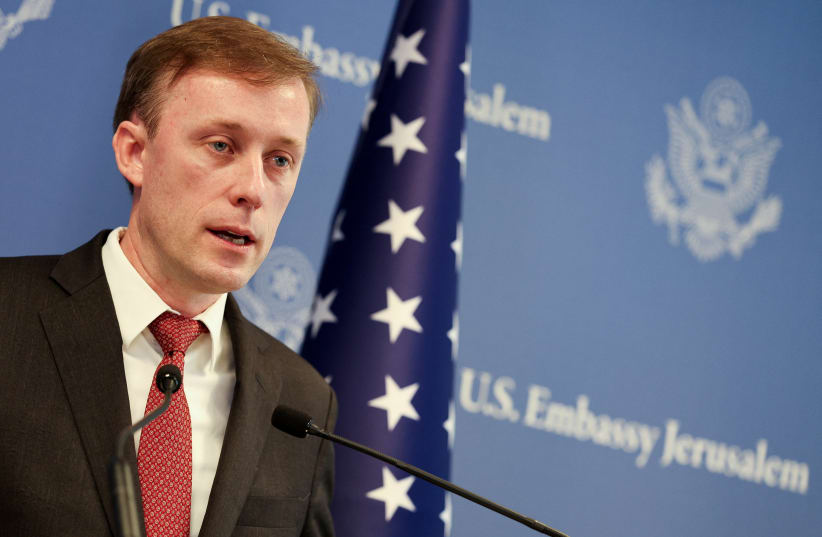
Diplomacy is the best way to neutralize the threat Hezbollah poses to Israel from its northern border with Lebanon, US National Security Adviser Jake Sullivan told reporters in Tel Aviv on Friday.
“We also believe that the threat can be dealt with through diplomacy and does not require the launching of a new war,” Sullivan said.
He spoke amid his second visit to Israel since the start of the Gaza war on October 7, which has been accompanied by an increase in cross-border violence between the IDF and Hezbollah on the country’s northern border.
Those Israelis who evacuated communities along Israel’s northern border out of fear of an attack similar to the kind that Hamas executed against the country’s southern border on October 7, “have to be able to return to their homes” with a “true sense of security,” Sullivan said.
“The best way to do this is to come up with a negotiated outcome in which those Israeli citizens in those communities up on the northern border can know that they will not be subject to an attack that will take their lives and destroy their communities, we will continue to work on that I believe we can accomplish,” Sullivan said.
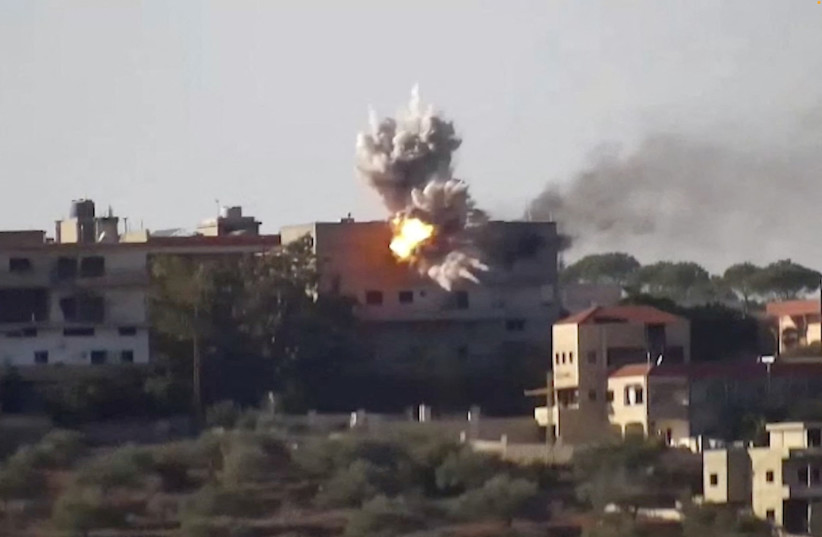
Deterrence important to diplomacy
Deterrence is an important element of that kind of diplomacy, Sullivan said.
“We need to send a clear message that we will not tolerate the kinds of threats and terrorist activity that we have seen from Hezbollah,” he stressed.
Israel's military said on Thursday that Iran-backed Hezbollah in Lebanon has fired hundreds of rockets and missiles at Israel, and about one in five of the rockets fell short inside Lebanon.
"Overall, approximately one in five rockets fired by Hezbollah since October 7th toward Israel have fallen inside Lebanese territory. Hezbollah's rocket attacks harm Israeli and Lebanese civilians alike," the military said.
Following the eruption of the Hamas-Israel war on Oct. 7, Hezbollah mounted near-daily rocket attacks at Israel while Israel launched air and artillery strikes in south Lebanon.
Reuters contributed to this report.
Health Min. to ICRC president: Hostages’ medical conditions deteriorating
At the meeting, the Health Ministry officials presented serious information and evidence about the mental and health condition of the abductees who returned to Israel from Hamas captivity.
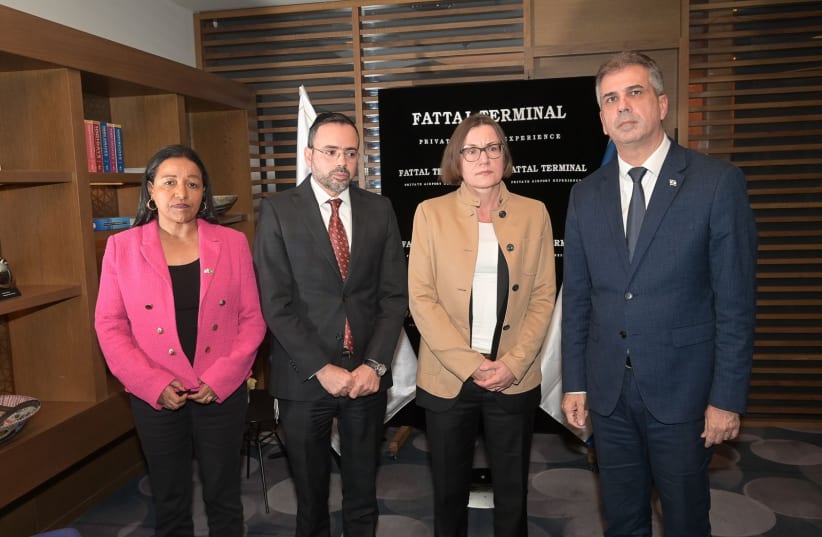
Health Ministry officials who met on Thursday evening with the president of the International Committee of the Red Cross (ICRC), Mirjana Spoljaric Egger, warned that the health condition of the 134 captives in Gaza is deteriorating every day and that some of them are in real danger.
Health Minister Uriel Bosso and director-general Moshe Bar SimanTov told her that Hamas has already proven to the whole world that it commits crimes against humanity, including against the elderly, women, and children. They demanded that the ICRC head and the organization must do everything to end the suffering of the hostages and their families immediately.”
At the meeting, the Health Ministry officials presented serious information and evidence about the mental and health condition of the abductees who returned to Israel from Hamas captivity.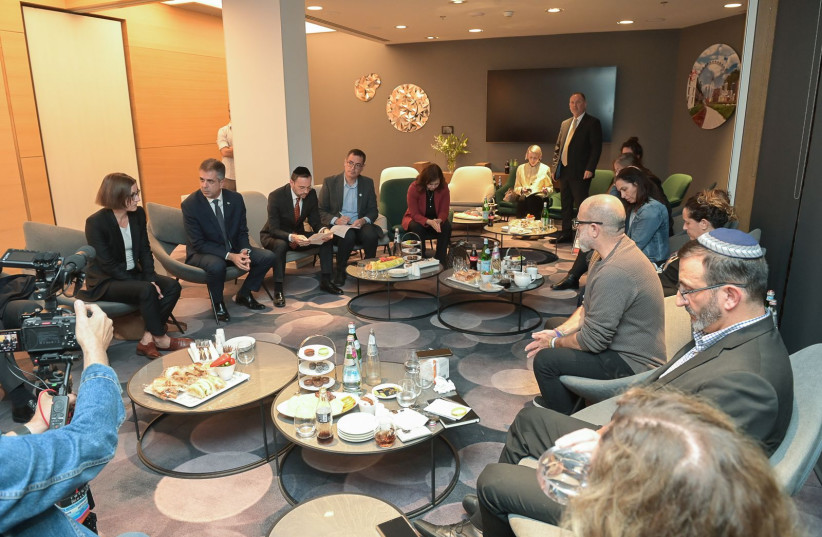
Foreign Minister Eli Cohen and his aides also attended the meeting.
The Israeli officials called for an immediate visit to the hostages by the Red Cross in to make sure that the abductees receive life-saving medical treatment. They also called on all health organizations to act immediately for the provision of medical help, which includes the supply of appropriate drugs and the provision of life-saving medical treatment, and of course – to act for their immediate release of all those abducted by the murderous organization Hamas.
“We were told about the hostages' indescribable suffering,” said Bar Siman Tov. “The many testimonies we do not publish and keep behind closed doors – but one thing is clear, every moment that passes without international bodies reaching them will cost their lives.”
President of the International Committee of the Red Cross (ICRC) on Thursday arrived in Israel to discuss "humanitarian needs and access to people affected by the ongoing conflict.”
Spoljaric will also meet the families of hostages to listen to their concerns and inform them of the “ongoing efforts being made by the ICRC to gain access to the captives.” So far, the ICRC has served merely as a “taxi company” to transport returnees on the short trip from Gaza to Israel.
Fifty-one-year-old Spoljaric Egger is a Swiss-Croatian diplomat who has headed the ICRC since October of last year. She studied philosophy, economics, and international law at the University of Basel and the University of Geneva and earned a master’s degree. She doesn’t have a medical background.
She joined the Swiss Federal Department of Foreign Affairs nearly a quarter of a century ago. She initially worked at the Swiss Embassy in Cairo and was a desk officer for the European Bank for Reconstruction and Development and Nuclear Safety in Central and Eastern Europe. From 2010 to 2012, Spoljaric Egger was sent to Jordan as a senior adviser at the office of the UN Commissioner General for the United Nations Relief Agency for Palestinian Refugees and Refugees (UNRWA).
In a post on X before arriving in Israel, Spoljaric said: “After visiting Gaza I am in Israel for ongoing discussions with authorities. I’m meeting families of hostages: ICRC must be granted permission, with practical details agreed between the parties, for visits to take place. I reiterate: the hostages must be released immediately.”
Go to the full article >>IDF retrieves bodies of Hamas hostages from Gaza
The military said that an "identification procedure" had been carried out by medical officials, military rabbis and forensic experts.
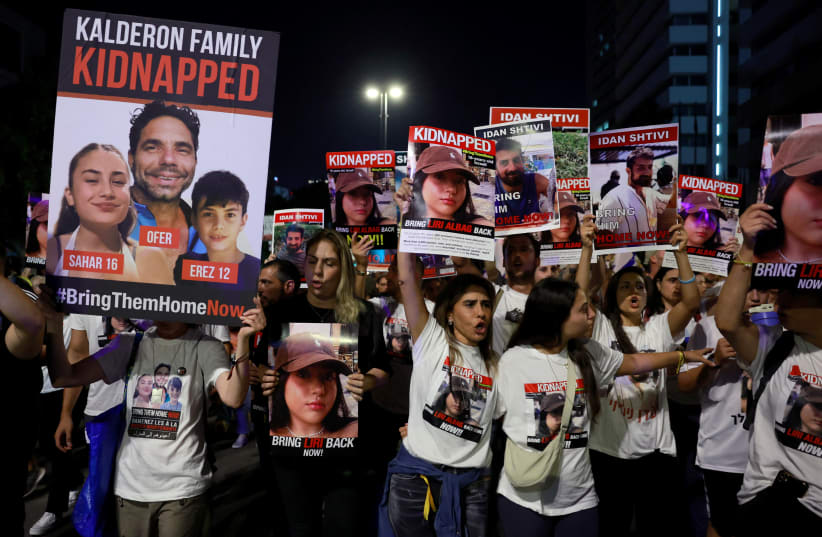
Israeli special forces have recovered the body of 28-year-old hostage Elia Toledano, who was held in the Gaza Strip by Hamas since its Oct. 7 rampage in southern Israel, the military said in a statement on Friday. Later on Friday morning, the IDF announced that it had retrieved the bodies of Corp. Nick Beiser and Sgt. Ron Sherman.
The IDF said that an "identification procedure" had been carried out by medical officials, military rabbis and forensic experts.
Soldiers from the 551st Brigade and Unit 504 in the Intelligence Division, under the command of Division 162 helped rescue the bodies from Hamas captivity, the IDF announced on Friday morning. 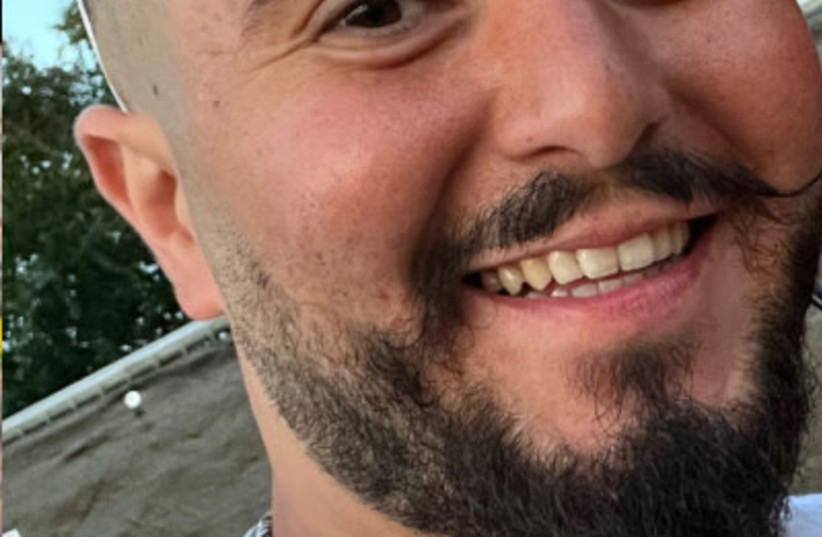
Kidnapped at Re'im music festival
Toledano was taken by Hamas from the Re'im music festival that turned into a massacre, Israeli media reported.
He was kidnapped alongside his girlfriend Mia Schem, who was released from captivity last month as part of the hostage-prisoner deal between Israel and Hamas.
Kidnapped while serving near Gaza border
Beiser, from Beersheba, was kidnapped while serving as a driver at the Gaza Coordination and Liaison Administration. Sherman, from Lehavim, was kidnapped while serving as a coordination and liaison officer at the Gaza Coordination and Liaison Administration.
More than 130 hostages remain in Gaza. Some have been declared dead in absentia by Israeli authorities.
Go to the full article >>IDF takes over, destroys Hamas' Shejaia headquarters
The IDF eliminated terrorists, located tunnel entrances, and destroyed terrorist infrastructure across the Gaza Strip.
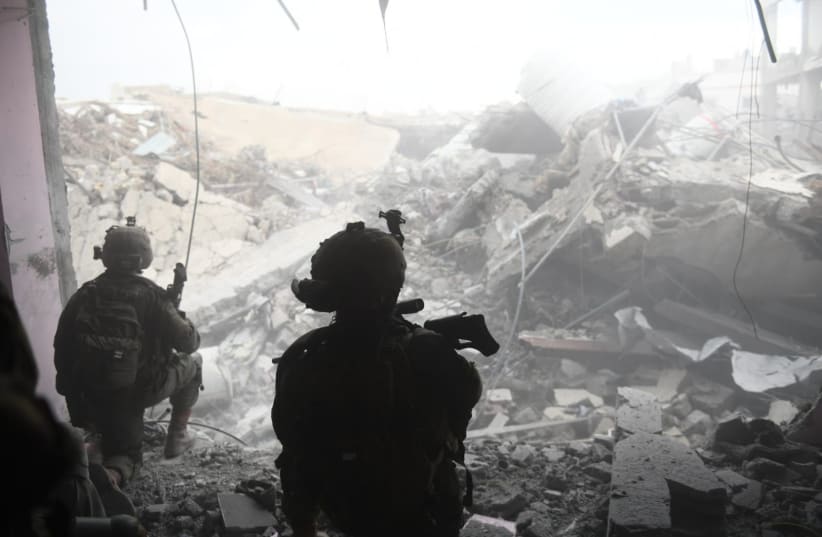
The IDF took over and destroyed the headquarters of the Hamas' Shejaia Battalion in Gaza City, while also advancing further into the heart of Khan Yunis, the IDF Spokesperson's Unit said on Friday morning.
The forces of the 188th Brigade, in coordination with armored, engineering, and infantry forces and the Air Force, carried out the operation to takeover the Shejaia Battalion's headquarters. On Tuesday, ten IDF soldiers, including several senior officers, were killed and six wounded in an ambush in Shejaia.
During the operation, the IDF eliminated terrorists and destroyed a tunnel shaft where a terrorist was hiding and trying to throw explosives at Israeli forces. The headquarters itself was destroyed by airstrikes, tank fire, and the IDF's engineering forces.
Additionally, during the operation, soldiers from the 414th Field Intelligence Battalion made use of the "Maoz" (Spike Firefly) kamikaze drone, specially designed for urban combat, for the first time to expose and strike a terrorist cell in the area.
The Maoz drone, which can be carried in a backpack and easily deployed in the field by infantry soldiers, has been used several times by the IDF in Jenin in the past year.
IDF continues advance into Khan Yunis
The IDF's Oz Brigade and the 7th Brigade also continued operations in Khan Yunis in southern Gaza over the past day, raiding terrorist infrastructure, eliminating many terrorists, and locating the entrances to tunnels used by Hamas.
During the raids in Khan Yunis, Israeli forces destroyed a weapons warehouse with Iron Sting precision mortars. The soldiers also found motorcycles inside a tunnel, which were used by Hamas in the October 7 attack.
Go to the full article >>Mossad Chief Barnea meets with US National Security Adviser Sullivan
There has been no order preventing Barnea or the Mossad from returning to Qatar to restart hostage negotiations.
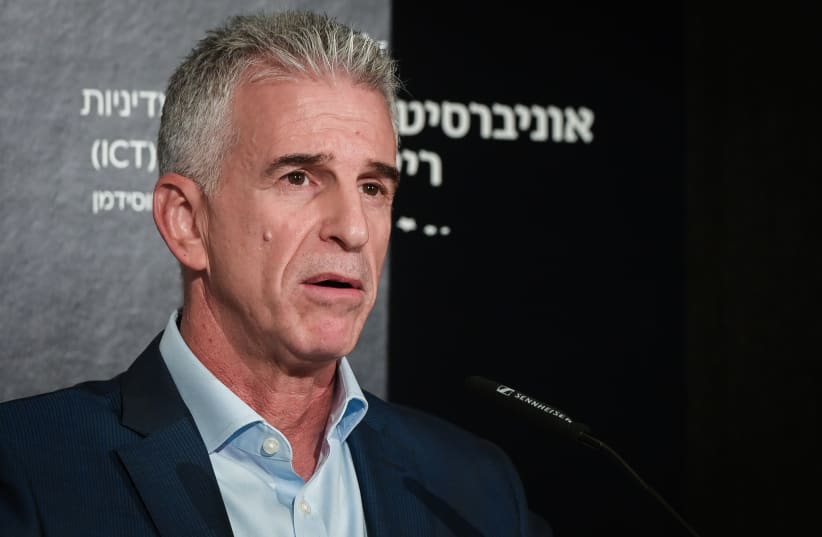
The Prime Minister's Office on Friday announced that Mossad Director David Barnea had met with US National Security Adviser Jake Sullivan at the spy agency's headquarters.
In their talks, Barnea focused on broad strategic issues, especially the triple-layered threat from Iran: from nuclear weapons progress to confronting its regional destabilization to its global and regional terrorism.
Sullivan and Barnea also discussed "the strength and the regional importance of continuing to formulate and build new links in the Middle East, as well as cooperation between the American and Israeli security agencies in implementing their joint interests."
The Jerusalem Post understands that Barnea has been at the forefront of expanding normalization, including with the Saudis, something which the current Gaza War has delayed by months, if not indefinitely.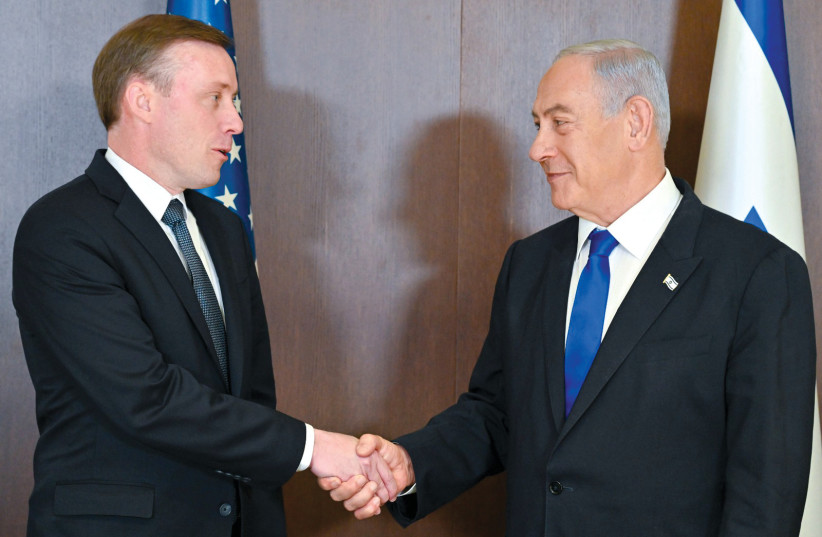
Could Qatar help renew hostage release deal?
On the issue of returning the hostages from Gaza, Barnea presented the challenges of negotiating with Hamas and thanked the US for its assistance on the issue.
The Post understands that despite contrary rumors, likely part of the ongoing political infighting within the war cabinet, there has been no order preventing Barnea or the Mossad from returning to Qatar to restart hostage negotiations.
Rather, Hamas has not been ready to engage in serious negotiations yet, despite a disinformation campaign it has attempted to propagate on the issue.
Following the meeting, the two lit candles for the eighth day of Hanukkah.
Go to the full article >>Hamas: 'Our tunnels are immune to surveillance attempts'
"The tunnels are an integral part of the resistance, and all potential consequences and expected attacks have been taken into account."
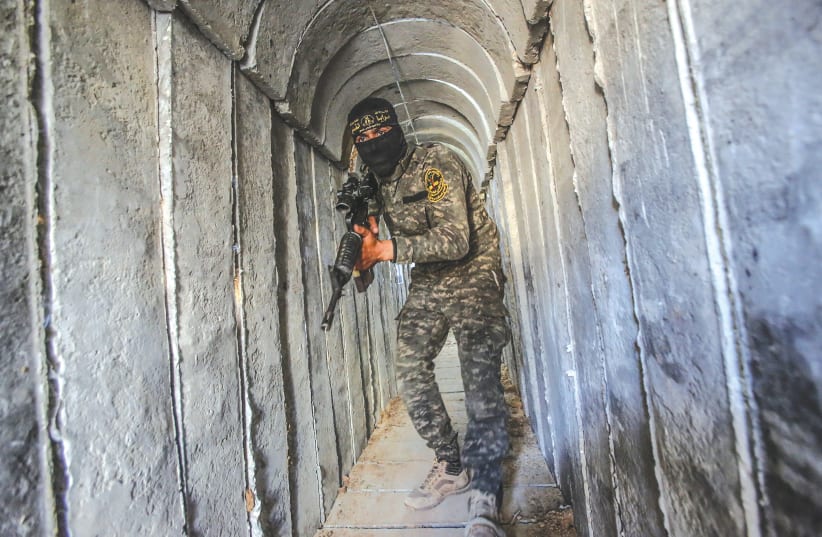
Hamas constructed its tunnels to resist attempts to detect them, stated the spokesperson of the terror group, Osama Hamdan, in a press conference held in Beirut in response to reports of possible tunnel detection by the IDF forces, CNN reported on Friday.
"The tunnels were built by skilled and knowledgeable engineers who considered all possible attacks from the occupation, including water pumping. The tunnels are an integral part of the resistance, and all potential consequences and expected attacks have been taken into account," said Hamdan.
Israel recently informed the United States that it has initiated a "thorough examination" of the detection of some of Hamas's tunnels in the Mediterranean Sea. Israel assured the American government that they only target tunnels in which they do not believe captives are held.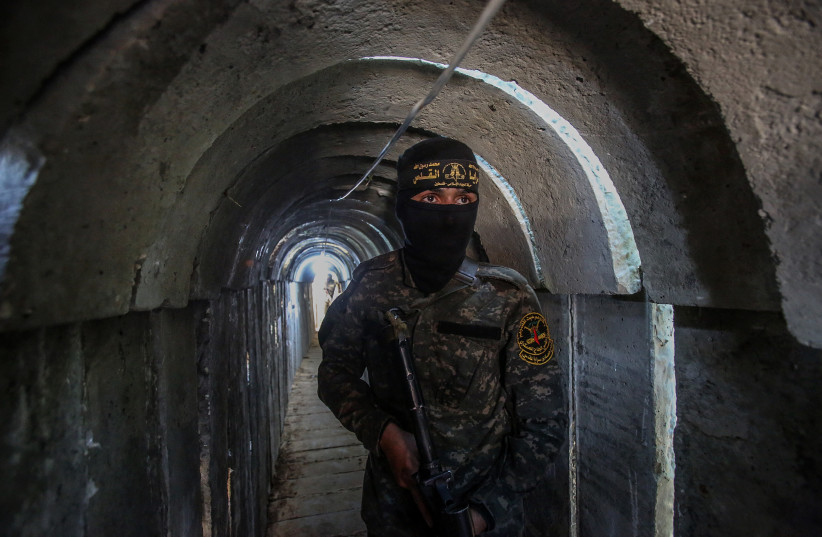
No release of more hostages yet
In addition, Hamdan addressed the issue of possible new negotiations aimed at releasing additional captives held in Gaza. "There will be no negotiations and no release of prisoners until an absolute cessation of hostilities against Gaza," said Hamdan.
Go to the full article >>France in grief over death of hostage in Gaza - foreign minister

France is in 'immense pain' over the news that Elia Toledano, a young man and French citizen who had been held hostage in Gaza amid the conflict with Israel, has died, Foreign Minister Catherine Colonna said on Friday.
"We share the grief of his family and loved ones", Colonna said in a post on social network X, after Israeli authorities had confirmed Toledano's identity, whose body had been found in Gaza.
Toledano was part of the group of people kidnapped by Hamas terrorists while taking part in an open-air music festival in early October, newspaper Le Figaro reported.
Go to the full article >>Israel-Hamas war: What you need to know
- Hamas launched a massive attack on October 7, with thousands of terrorists infiltrating from the Gaza border and taking some 240 hostages into Gaza
- Over 1,200 Israelis and foreign nationals were murdered, including over 350 in the Re'im music festival and hundreds of Israeli civilians across Gaza border communities